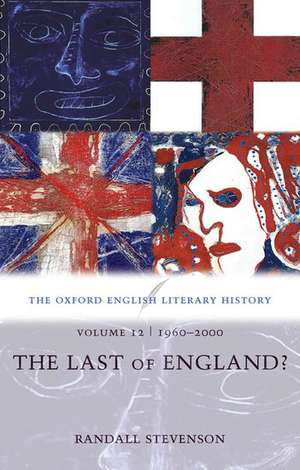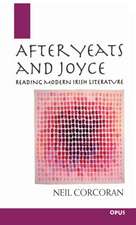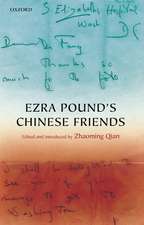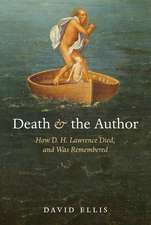The Oxford English Literary History: Volume 12: 1960-2000: The Last of England?: Oxford English Literary History, cartea 12
Autor Randall Stevensonen Limba Engleză Paperback – 10 noi 2005
Preț: 303.49 lei
Preț vechi: 362.70 lei
-16% Nou
Puncte Express: 455
Preț estimativ în valută:
58.07€ • 60.63$ • 48.06£
58.07€ • 60.63$ • 48.06£
Carte tipărită la comandă
Livrare economică 24-31 martie
Preluare comenzi: 021 569.72.76
Specificații
ISBN-13: 9780199288359
ISBN-10: 0199288356
Pagini: 644
Ilustrații: 15 halftones
Dimensiuni: 137 x 217 x 32 mm
Greutate: 0.94 kg
Editura: OUP OXFORD
Colecția OUP Oxford
Seria Oxford English Literary History
Locul publicării:Oxford, United Kingdom
ISBN-10: 0199288356
Pagini: 644
Ilustrații: 15 halftones
Dimensiuni: 137 x 217 x 32 mm
Greutate: 0.94 kg
Editura: OUP OXFORD
Colecția OUP Oxford
Seria Oxford English Literary History
Locul publicării:Oxford, United Kingdom
Recenzii
For much of the period covered here the literature of England was dogged by an all-pervading sense of failure and decline. In Stevenson's analysis, a "misplaced nostalgia" impeded the progress of English drama, fiction and especially poetry. Philip Larkin mourned an "England gone", and he cast a long shadow over English verse. "English literature was never more static than under the influence of the Movement," says Stevenson. "If the later 20th century proved a difficult period for poetry, it was in large measure because it took so long to realise this, and move on."
English theatre fared better, raising issues of class (kitchen-sink drama) and sex, with Harold Pinter adding a dash of Beckettian absurdity; though its faltering progress is neatly summed up in the chapter title "Revolution, Television, Subsidy". As for the English novel, everyone was busy predicting its demise in the 1960s, but it was still going strong at the end of the century, with Salman Rushdie giving it a new multicultural spin. If this wise and fascinating survey has a single message, it is not to confuse change with loss.
English theatre fared better, raising issues of class (kitchen-sink drama) and sex, with Harold Pinter adding a dash of Beckettian absurdity; though its faltering progress is neatly summed up in the chapter title "Revolution, Television, Subsidy". As for the English novel, everyone was busy predicting its demise in the 1960s, but it was still going strong at the end of the century, with Salman Rushdie giving it a new multicultural spin. If this wise and fascinating survey has a single message, it is not to confuse change with loss.
Notă biografică
Randall Stevenson is Reader in English Literature and Deputy Head of Department at the University of Edinburgh. He is the author of Modernist Fiction (1992; revd. edn, 1998); A Reader's Guide to the Twentieth-Century Novel in Britain (1993); The British Novel Since the Thirties (1986), and many articles on modernist and postmodernist fiction.





















